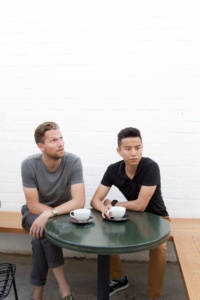If you aren’t familiar with the idea of a fringe show, it’s basically a theater version of the Sundance Film Festival. You never really know if the show you are walking into is going to be good or bad, high budget with lights and a set or a guy with a sheet sitting on a beat-up old chair. Most of the shows you are going to see are experimental, and when it comes to theater, that can mean anything.
“Marty has Cancer” is one such show. It labels itself a dark comedy about friendship. There are quite a few shows this year that deal with dark topics by trying to find humor in them. “Marty has Cancer” is neither the best nor the worst of the lineup.
As far as production goes, there are only four actors, all four of whom are fairly engaging. Jess Kellner as Rhoul and Sean Sekino as Choi have an excellent repartee and bring the majority of the play’s life and humor. Kellner is by far the standout star of the show. He is the voice of reason, the emotional heart and the strongest actor. Sekino plays a somewhat scatterbrained, self-conscious and semi-defensive character whose tact is severely lacking when it comes to sensitive situations. Sekino plays this role very well, but his monologues feel more scripted than discovered, and on occasion he speaks so fast it can be hard to follow.
[media-credit name=”Prufrock Productions” align=”alignnone” width=”200″] [/media-credit]
[/media-credit]
Dylan Stretchbery plays the title character of Marty. He is not funny at all, as one might expect from someone dying of cancer. Stretchbery plays the melancholy, down-and-out character with strong commitment, which takes on new meaning at the end of the play. However, I’m not quite sure I bought the final twist based off of Stretchbery’s overall demeanor. Marty’s sister, played by Marza Warsinske, is a normal and human voice in the midst of some very dramatic boys. She is a breath of fresh air at the end of show, and even as she delivers the final heart-wrenching blow, her satirical and somewhat cynical demeanor balances the ending so it is only sad instead of crushing. She had by far the least stage time, and yet she was the most human of the four.
Speaking of the stage, “Marty has Cancer” has one of the most put-together and traditional-feeling stages. This show was beautifully lit, and although the costumes seemed like everyday clothes, they fit the characters well. The scenes in Hawaii feature some very fashionable swim trunks. There was clear thought towards color in both set and costuming, and the director did a great job of providing just enough visual context without overfilling a small space. The only problem with the technical aspects of the show are three rather lengthy scenes changes, which I suspect were due to radical costume changes. About ten minutes of the hour show is dead space. On that note, the show itself is slow-moving. The dialogue moves at a good pace, but there are long moments of contemplation. At one point Stretchbery addresses the audience, but speaks over our heads rather than making direct contact. His monologue was heartfelt, but seemed rehearsed and didn’t quite land, in my opinion.
Overall, this show is a good show for thought and certainly worth going to if you don’t mind walking out with a heavy heart. Although there are funny moments, I would not categorize “Marty has Cancer” as a comedy. Instead, I would call it a heartfelt drama about friendship, frustration and trust. It is worth seeing to enjoy Kellner and Warsinske’s performances, but go at time when you can walk out into the sunshine and take a breath of fresh air afterward.


